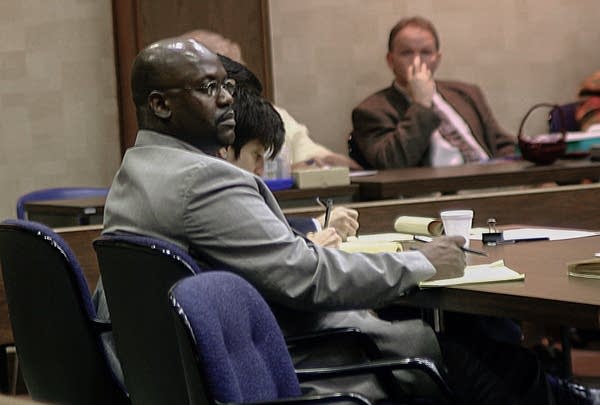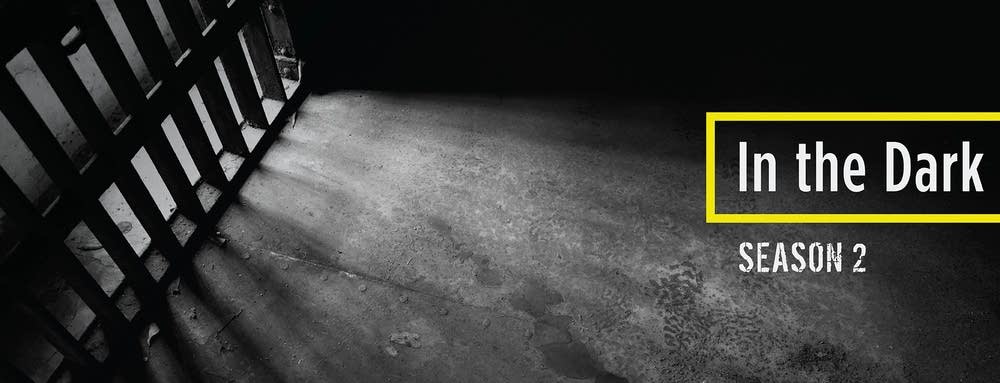If Your Aquitted Can You Be Tried Again
The answer to this question involves one person: the local district attorney. He or she has broad discretion over whether to accept a case to trial, or, in the Curtis Flowers case, to repeated retrials.
If a prosecutor takes a criminal case to trial and the defendant is found not guilty, then it's over. The Fifth Amendment to the U.S. Constitution forbids the government from re-prosecuting someone for a law-breaking once they've been acquitted — this is commonly known every bit double jeopardy.
But what's happened in the Flowers case is different. Flowers has never been acquitted. In his first three trials, he was bedevilled. Those convictions were afterward thrown out by an appeals court, which ruled that the prosecution made critical mistakes. Each time, the guilty verdict was substantially erased from the books, and the case went dorsum to the commencement. The next two juries — in trials four and 5 — never reached a verdict. They just deadlocked and the proceeding ended in a mistrial.
Afterward each one of these offset five trials, the prosecutor in the case, Doug Evans, had a choice to make. Would he drop the murder charges confronting Flowers and release him or try once again to convict him? And each fourth dimension, Evans, who's been in office for more than two decades, chose to effort Flowers again. The 6th trial's guilty verdict has so far held up.
Double jeopardy doesn't employ considering, in consequence, Flowers hasn't endured 6 trials for the aforementioned crime. He's just had a outset trial — six times.
There's zero in the law that bars a prosecutor from doing this — from retrying a case when the jury hasn't reached a unanimous verdict or a conviction hasn't stuck. That said, there's nothing that requires a prosecutor to attempt a example over and over once more, either — and most don't.

How ofttimes does this happen?
No i tracks instances of repeated prosecutions at a national level. Even at a local level, these cases live on mostly in the memories of the attorneys and clerks that handled them. Nosotros conducted an informal poll of land prosecutors, defense force attorneys, legal scholars, lawyers' associations, and civil rights organizations. Had any of them heard of someone, other than Curtis Flowers, being tried six times for the same offense? The reply was unanimous: Nope.
There are some examples if you dig. Between 2000 and 2005, a Mississippi man named Marcus Roberson was brought to trial viii times on murder charges. Merely v of those trials actually reached the jury deliberation phase. The other three were declared mistrials at the get-go. Later on the last mistrial, Roberson pled guilty to manslaughter. Multiple prosecutions practise happen, only they are rare.
"There'south an unspoken rule that three times is sort of the max," said Hermann Walz, a former assistant district attorney in New York City and professor at John Jay College of Criminal Justice. "After three, most prosecutors decide that the evidence simply isn't there."
Walz said that certain factors can encourage a prosecutor to try a case a second or 3rd time. If merely ane or two holdouts prevented the jury from reaching a guilty verdict, the case may nevertheless seem solid. If the jury bedevilled the accused but that conviction was overturned on procedural grounds, a prosecutor might feel that correcting those errors and trying over again is part of his duty to protect the public from a potentially unsafe criminal.
There can exist upsides to a do-over. "Unremarkably the second fourth dimension around it gets better for the prosecution," said Melba Pearson, deputy director of the Florida ACLU and a long-time prosecutor in Miami-Dade County. "Y'all're presenting the aforementioned evidence, you kind of know what worked and what didn't."
But multiple trials tin too rack up costs in taxpayer dollars, jurors' time, and stress on victims and their families. And the instance itself starts to autumn autonomously. "By the 3rd time trying the example, you're losing witnesses," Pearson said. "People retire, people pass away, people move, people say, 'You know what, I'chiliad fed upwardly, I don't want to be a part of this anymore, don't telephone call me.'"

Then why keep pushing?
"The stated reason to re-prosecute a instance is nearly always a connected belief that the individual is actually guilty of the crimes charged," said John Hollway, executive director of the Quattrone Middle for the Fair Administration of Justice at the University of Pennsylvania Law School. "What's more hard to parse is any potential unstated rationale."
Political pressure to prosecute can be immense. In about every jurisdiction in the Us, district attorneys are elected officials. Failure to secure convictions can sink an upcoming campaign. This is especially true in loftier-profile cases, where the victims are prominent citizens or outspoken advocates or the offense is especially heinous.
"When confirmation bias toward the land's theory of the criminal offence combines with the psychological fearfulness of embarrassment or error ... it is easy to see how fifty-fifty a well-intentioned prosecutor might cling desperately to actual guilt as a rationale for continuing to prosecute the example," Hollway said.
And when a prosecutor does cling to a example, there are only a few ways to put an stop to it — all of them hard to come past.
The starting time is a judicial finding, frequently by an appeals court, of bodily innocence — when in that location's new bear witness or a DNA exoneration, for instance. The second is an acquittal in a retrial. The third is a successful motion past the defense to go the prosecutor disqualified from pursuing the case any farther.
"The statement would exist, 'Hey, if this had been a fair trial, this guy would be acquitted and double jeopardy would apply," Hollway said. "The defence attorney is basically saying, 'Come on. You don't go to misbehave and and so retry the guy.'"
Before Curtis Flowers' third trial, his defense team attempted something along these lines. Attorney John Gilmore wrote a move that was the first procedural footstep toward having Evans removed from the case. Gilmore cited legal precedent for disqualifying a prosecuting attorney in a case where he's shown bias or has engaged in serious misconduct.
The judge, Clarence Morgan, didn't have much time to consider Gilmore's argument. He issued his ruling the very same mean solar day that the motion was filed — in a fast-moving hearing that was essentially a lightning circular of pretrial motions. Rolling out of one motion and into the side by side, Judge Morgan put the question of Doug Evans' disqualification to Doug Evans himself.
"Mr. Evans," the gauge said, "exercise you lot know of any reason yous ought to be disqualified now?"
"Non that I'm aware of, Your Award," Evans replied.
"Based on that statement," Judge Morgan said, "the motion is overruled."
Doug Evans would stay on the case. And non long subsequently that, Curtis Flowers went on trial again.

The second flavor of the In the Nighttime podcast is nearly the case of Curtis Flowers, who was tried six times for the same crime. Learn more.

earlsoripsensfuld.blogspot.com
Source: https://www.apmreports.org/story/2018/05/01/how-can-someone-be-tried-six-times-for-the-same-crime
0 Response to "If Your Aquitted Can You Be Tried Again"
Post a Comment